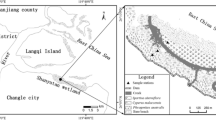Abstract
Traits have been revealed in the microbial processes of methane formation and organic matter destruction in bottom sediments of technogenic water bodies, in which at the abundance of Corg compounds, including toxic, dissolved oxygen deficiency, and low redox potential, organic matter decay in sediments is mostly anaerobic with the predominance of methanogenesis and sulfate reduction. Data on major microbial processes are used to calculate the total sludge destruction; it is maximal in the sediments of low-toxicity technogenic water bodies; organic matter destruction in them is mostly due to methanogenesis; it is minimal in high-toxicity water bodies, the share of sulfate reduction in them increases, and that of methanogenesis decreases.
Similar content being viewed by others
References
Belyaev, S.S., Lebedev, V.S., and Laurinavichus, K.S., Present-day microbial methane formation in freshwater lakes in Mari ASSR, Geokhimiya, 1979, no. 6, pp. 933–940.
Belyaev, S.S., Lein, A.Yu., and Ivanov, M.V., The role of methane-generating and sulfate-reducing bacteria in organic matter destruction processes, Geokhimiya, 1981, no. 3, pp. 437–445.
Dzyuban, A.N., Bacteriobenthos of the Upper Volga reservoirs as a characteristic of their environmental state, Water Resour., 2003, vol. 30, no. 6, pp. 680–688.
Dzyuban, A.N., Bacterioplankton and bacteriobenthos of three floodplain lakes in the lower course of the Amur River, Microbiology (Moscow), 2002, vol. 71, no. 4, pp. 471–478.
Dzyuban, A.N., Intensity of the microbiological processes of the methane cycle in different types of Baltic lakes, Microbiology (Moscow), 2002, vol. 71, no. 1, pp. 98–104.
Dzyuban, A.N., Microbiological characteristic of bottom sediments in the Upper Volga under anthropogenic impact, Biol. Vnutr. Vod, 2006, no. 1, pp. 16–23.
Dzyuban, A.N., Microbiological processes of organic matter turnoverin deposits of the Volga-Kama Chain of Reservoirs, Water Resour., 1999, vol. 26, no. 4, pp. 411–420.
Dzyuban, A.N., Kosolapov, D.B., and Kuznetsova, I.A., Microbiological processes in the Gor’kovskoe Reservoir, Water Resour., 2001, vol. 28, no. 1, pp. 42–54.
Kuznetsova, I.A. and Dzyuban, A.N., Assessement of total organic matter destruction in bottom sediments of water bodies, Gidrobiol. Zh., 2002, vol. 38, no. 5, pp. 94–98.
Kuznetsov, S.I. and Dubinina, G.A., Metody izucheniya vodnykh mikroorganizmov (Methods for Studying Aquatic Microorganisms), Moscow: Nauka, 1989.
Romanenko, V.I., Mikrobiologicheskie protsessy produktsii i destruktsii organicheskogo veshchestva vo vnutrennikh vodoemakh (Microbiological Processes of Organic Matter Production and Destruction in Inland Water Bodies), Leningrad: Nauka, 1985.
Romanenko, V.I., Zakharova, L.I., Romanenko, V.A., et al., Water quality assessment by microbiological characteristics in the Rybinsk Reservoir at Cherepovets C., in Vliyanie Stokov ChPU na ekologicheskoe sostoyanie Rybinskogo vodokhranilishcha (Effect of ChPU Effluents on the Environmental State of the Rybinsk Reservoir), Rybinsk, 1990, pp. 24–41.
Adams, D.D. and van Eck, G.Th., Biogeochemical cycling of organic carbon in the sediments of the Grote Rug reservoir, Arch. F. Hydrobiol. Ergebn. Limnol., 1988, vol. 31, pp. 319–330.
Dzyuban, A., Kopylov, A., Kosolapov, D., et al., Effect of industrial-sanitary savage on benthic microbial communities in the Upper Volga (Russia), Partnerships for the Environment: Science, Education and Policy. SETAC, 17th Ann. Meeting, Washington, DC: SETAC, 1996, pp. 303–304.
Hjort, J., Bergstrom, H., Ekedahl, G., Lindgren, O., Nitrifikation och nitrifikationshamning i samband med BOD-analys, Vatten, 1985, vol. 41, no. 4, pp. 259–262.
Molongosski, J.I., Klug, W.K., and Michael, J., Anaerobic metabolism of particulate organic matter in the sediments of a hypereutrophic lake, Freshwater Biol., 1980, vol. 10, no. 6, pp. 507–518.
Naguib, M., A rapid method for the quantitative estimation of dissolved methane and its application in ecological research, Arch. Hydrobiol., 1978, vol. 82, pp. 66–73.
Sorrell, B.K. and Boon, P.J., Biogeochemistry of billabong sediments. 2. seasonal variations in methane production, Freshwater Biol., 1992, vol. 27, no. 3, pp. 435–445.
Topp, E. and Knaules, R., Use of inhibitors for aerobic CH4- and NH3-oxidising bacteria, FEMS Microbiol. Lett., 1982, vol. 14, no. 1, pp. 47–53.
Author information
Authors and Affiliations
Corresponding author
Additional information
Original Russian Text © A.N. Dzyuban, 2014, published in Vodnye Resursy, 2014, Vol. 41, No. 3, pp. 330–338.
Rights and permissions
About this article
Cite this article
Dzyuban, A.N. Methanogenesis and organic matter destruction in bottom sediments of technogenic water bodies. Water Resour 41, 344–351 (2014). https://doi.org/10.1134/S0097807814020079
Received:
Published:
Issue Date:
DOI: https://doi.org/10.1134/S0097807814020079



